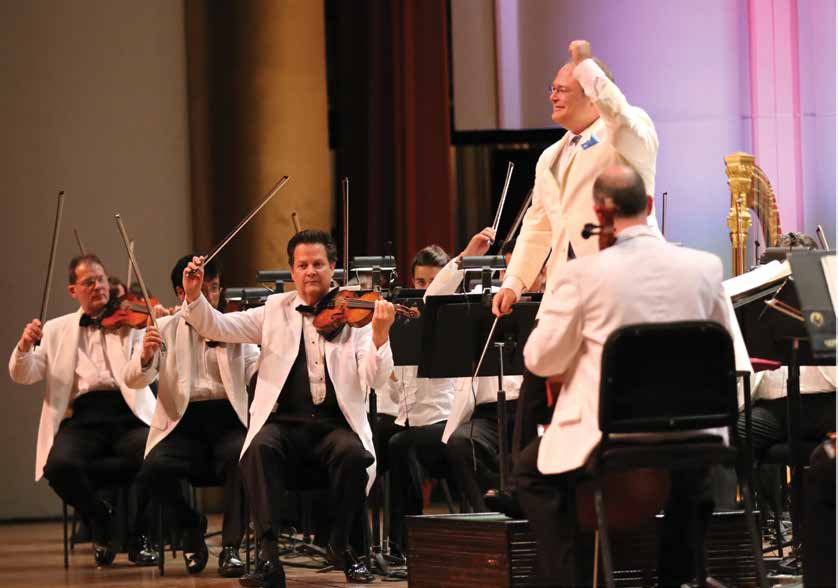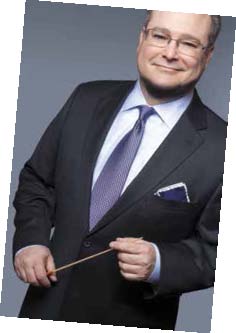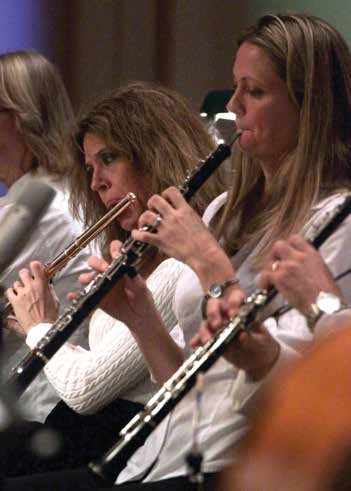POPS 4
 Without music, movies would feel different. Jaws isn’t as terrifying without the nearly claustrophobic theme music. Gone With The Wind would seem much less epic without the sweeping Tara’s Theme. Up would be less, well, uplifting without its jazzy score.
Without music, movies would feel different. Jaws isn’t as terrifying without the nearly claustrophobic theme music. Gone With The Wind would seem much less epic without the sweeping Tara’s Theme. Up would be less, well, uplifting without its jazzy score.
“For so many of us, the music is how we remember so many famous scenes,” says pops conductor Stuart Chafetz, who leads the Naples Philharmonic in a celebration of movie music on March 29-April 2. “Can you imagine Jaws with different music? It wouldn’t be the same.”
“Actually, one of the pieces we are performing is Also Sprach Zarathustra from 2001: A Space Odyssey. That wasn’t the original music for the movie. It had this other score that was scrapped. When I heard that music, I thought about how it would completely change the landscape of that film.”
When coming up with the repertoire for the Hooray for Hollywood concerts, Chafetz and Artistic Operations Vice President David Filner spent a lot of time to create a program full of memorable movie moments that local audiences haven’t heard in a while. Luckily, Chafetz noted there is no shortage of wonderful music at significant movie moments. “It’s harder to decide what to leave out than what to put in,” he says.
 “You want a lot of variety,” he says. “And you want to not repeat things the audience has heard in the recent past. And you have to keep it relevant. Naples has a tremendous pops tradition.”
“You want a lot of variety,” he says. “And you want to not repeat things the audience has heard in the recent past. And you have to keep it relevant. Naples has a tremendous pops tradition.”
The result is a concert that spans decades of movie making and generations of fans. From the late 1930s and early 1940s (When You Wish Upon a Star) to the 1990s and the music from Austin Powers, the performances run from the dramatic to the drop-dead funny. Along with vocalist Nicole Parker, who you might have seen as Elphaba in Wicked on Broadway, the orchestra is going to bring the big-screen music to life. Here are a few of the amazing pieces of music you’ll hear:
GET HAPPY
This Harold Arlen hit, named one of the top 100 movies songs by the American Film Institute, had a long life before Judy Garland made her memorable turn in that black hat, tuxedo jacket and stockings in Summer Stock. Written in 1929, it was the first well-known song by the venerable composer, coming out nearly a decade before his more famous collaboration with Garland—Over The Rainbow. The song first was a smash at the famous Cotton Club before becoming a jazz standard by the time Garland
recorded it for her final MGM film. Later, it was a standard for everyone from Bud Powell to Frank Sinatra.
 THE GOOD, THE BAD AND THE UGLY THEME
THE GOOD, THE BAD AND THE UGLY THEME
No piece of music calls to mind a particular genre of movies as clearly as Ennio Morricone’s theme to Sergio Leone’s final installment of his Spaghetti Western Dollars trilogy. From the opening pounding timpani to the distinctive two-note melody that is repeated throughout, the listener is transported to the high desert plains of the American west.
CALL ME
The music for this Blondie hit and the theme to American Gigolo was originally intended for Stevie Nicks. But when Nicks’ new record label wouldn’t let her work with composer-producer Giorgio Moroder, Debbie Harry was called in as a replacement. Legend has it that within hours of hearing the backing music, Harry had written the lyrics and melody to what would be her band’s biggest hit and an anthem to the opulence of the 1980s.
I WILL ALWAYS LOVE YOU
A song Dolly Parton wrote as a goodbye to her performing partner Porter Wagoner as they were splitting, I Will Always Love You became one of the most popular songs of all time in the hands of pop superstar Whitney Houston. The single alone sold more than 20 million copies and propelled the movie’s soundtrack to become the best-selling movie recording ever.


Leave a Reply
Want to join the discussion?Feel free to contribute!